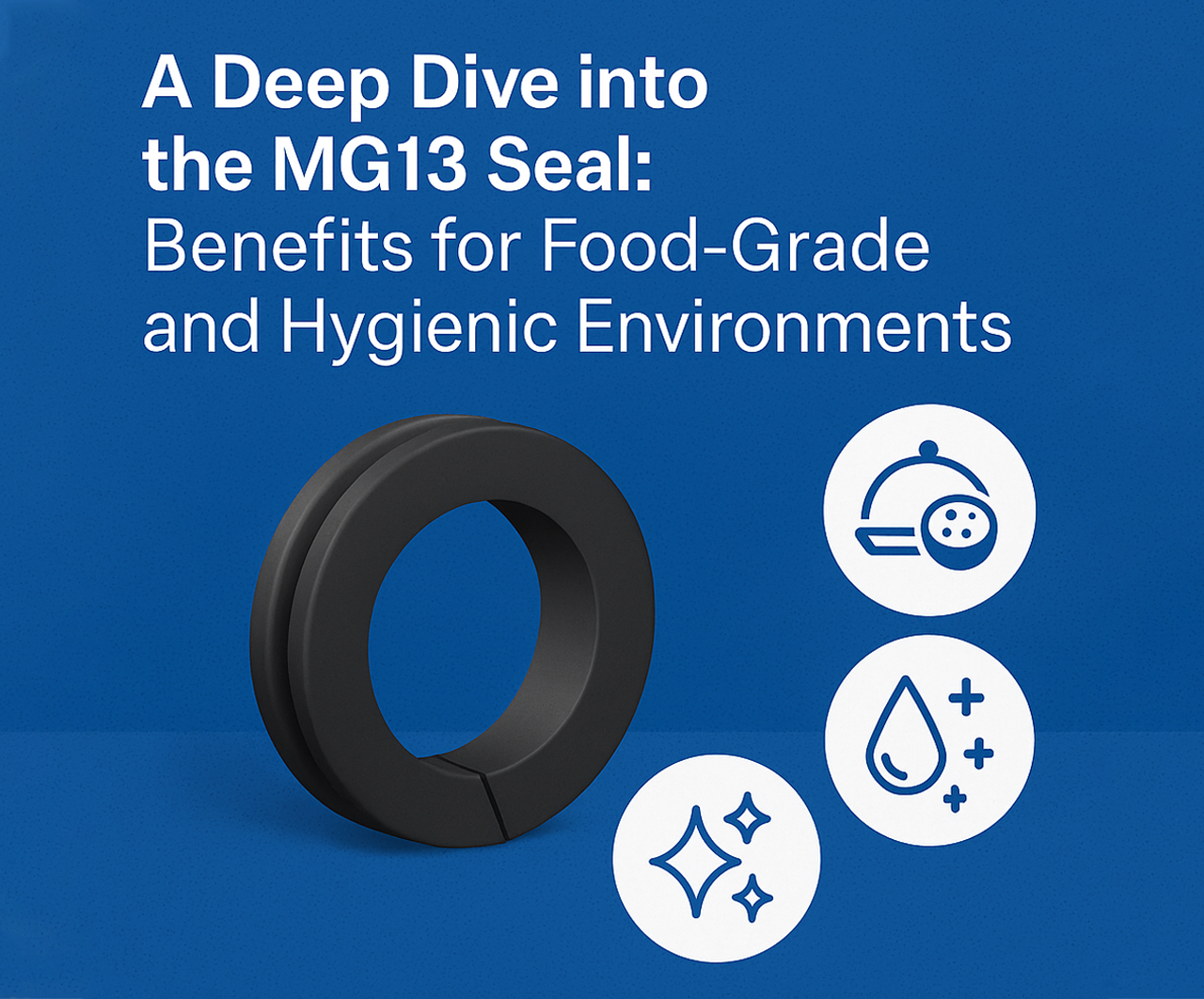In industries where hygiene is non-negotiable and reliability is critical, the MG13 mechanical seal has become a trusted component. From dairy to beverage processing, facilities rely on a pump with mechanical seals that deliver both precision and cleanliness. Trusted brands like John Crane mechanical seal systems and Flowserve mechanical seal solutions often use the MG13 platform to meet regulatory requirements and operational demands in food and pharmaceutical production. But what exactly makes the MG13 seal ideal for these specialized environments?
This article takes a detailed look at the MG13 seal—its design, applications, and how it compares to other mechanical seal types. We’ll explore why it’s become a mainstay in food-grade and hygienic equipment. Know more..
What Is the MG13 Seal?
The MG13 is a unbalanced, single-spring, elastomer bellows mechanical seal. Its compact and standardized design makes it compatible with a wide range of equipment, especially where the shaft size and seal chamber dimensions are regulated under EN12756 (formerly DIN 24960) standards.
Designed to be used in rotating equipment, such as a pump with mechanical seals, the MG13 is especially valued in systems that handle:
- Milk, cream, yogurt
- Beer and carbonated drinks
- Juice concentrates
- Purified water
- Liquid pharmaceuticals
Unlike more complex designs, the MG13 seal is relatively simple, cost-effective, and easy to maintain—making it ideal for operations requiring frequent cleaning or equipment teardown.
Key Components and Material Options
A core strength of the MG13 seal is its modularity. Seal faces, secondary sealing elements, and spring materials can be customized to suit food and hygiene standards.
Primary Seal Faces:
- Carbon (Resin or Antimony impregnated)
- Silicon Carbide
- Tungsten Carbide
Mating Ring Options:
- Ceramic
- Silicon Carbide (preferred for clean-in-place, or CIP, environments)
Elastomers:
- EPDM (common for dairy and food)
- FKM (for hot oils and certain CIP fluids)
- PTFE (for chemical compatibility)
These choices allow the MG13 to meet FDA, EU 1935/2004, and USP Class VI material compliance when used in hygienic environments.
How the MG13 Supports Clean Design Principles
Hygienic system design is guided by one principle: eliminate places where bacteria and product residue can hide. The MG13 fits this approach well by offering:
- Self-cleaning elastomer bellows: The design resists residue accumulation and reduces cleaning cycle times.
- No dynamic O-ring at the shaft: Prevents product contamination and leakage paths.
- Smooth, non-pitted contact surfaces: Polished seal faces are compatible with SIP (steam-in-place) and CIP processes.
- Low dead volume: Compact form minimizes areas where microbes could colonize.
Many leading pump with mechanical seals options used in the food industry—including those offered by John Crane and Flowserve mechanical seal lines—offer the MG13 as a drop-in component for food-grade configurations.
Advantages Over Other Seal Types
| Feature | MG13 Seal | Cartridge Seal | Gland Packing |
| Cleanability | High | High | Low |
| Cost | Low to moderate | High | Low |
| Ease of Maintenance | Easy to replace and install | Requires fewer adjustments | Frequent retightening |
| Suitability for Hygienic Use | Excellent with proper materials | Excellent with FDA kits | Poor |
| Versatility | Wide elastomer/material options | Limited to specific cartridge | Low |
The MG13 balances affordability, performance, and hygiene—qualities that are particularly important in plants where equipment needs regular disassembly for deep cleaning.
How MG13 Seals Work in Food-Grade Pumps
Inside a pump with mechanical seals, the MG13 sits between the rotating shaft and the stationary housing. As the pump operates, the elastomer bellows compress to maintain seal face contact, ensuring a consistent barrier between product and atmosphere.
The spring-loaded design accommodates shaft misalignment, thermal expansion, and vibration—all of which are common in high-speed, high-volume production environments.
When used with a Flowserve mechanical seal housing or a John Crane mechanical seal pump head, MG13 seals maintain pressure integrity even under CIP and SIP thermal stress conditions.
Real-World Applications
Dairy Processing Plant
A major dairy producer integrated MG13 seals into their milk separation and pasteurization lines. The seals withstood daily CIP cycles and 120°C SIP routines without degradation.
Results:
- 30% reduction in seal replacement costs
- Improved CIP cleaning time by 18%
- Zero contamination incidents over 12 months
Beverage Manufacturing
A soda bottling facility switched from gland packing to MG13-based John Crane mechanical seal assemblies.
Results:
- Dramatic reduction in product loss
- Reduced energy consumption due to lower friction
- Longer pump maintenance intervals
Compatibility with Leading Brands
The MG13 seal is widely compatible with:
- Alfa Laval pumps
- APV/SPX FLOW
- Fristam
- Grundfos sanitary pumps
- And many more hygienic system OEMs
Both Flowserve mechanical seal systems and John Crane mechanical seal product lines include MG13 variants tailored to these applications, with FDA and 3A certification where applicable.
Key Considerations for Selection
When choosing the MG13 for hygienic use, consider the following:
- Shaft size and seal chamber dimensions: Must match DIN EN12756 specs.
- Fluid media: Identify pH, viscosity, and CIP/SIP chemical agents.
- Temperature range: Ensure compatibility with steam cycles.
- Cleaning frequency: Higher cleaning rates may require more resistant elastomers and face combinations.
Installation and Maintenance Best Practices
- Use alignment tools to ensure proper face pressure during install.
- Lubricate seal faces with compatible, food-grade lubricant.
- Check spring tension to maintain optimal compression.
- Visually inspect after each CIP cycle for cracks, hardening, or extrusion.
Proper installation is especially important when pairing the MG13 with a pump with mechanical seals exposed to thermal cycling.
Looking Ahead: Innovation in Hygienic Sealing
The future of hygienic seals is evolving, and the MG13 is keeping pace with:
- Bio-compatible elastomers: For sensitive pharmaceutical applications
- Smart sealing tech: RFID tags for maintenance tracking
- Eco-friendly materials: For recyclable or low-emission components
Both John Crane mechanical seal and Flowserve mechanical seal divisions are investing heavily in R&D to upgrade the MG13 platform for digital integration and sustainability.
Final Thoughts: Why MG13 Is a Smart Choice
For operations seeking a balance of hygiene, affordability, and performance, the MG13 seal remains a top-tier solution. Whether you’re using a pump with mechanical seals in a milk processing plant or installing a new Flowserve mechanical seal system in a beverage line, the MG13 offers:
- Regulatory compliance
- Easy maintenance
- Long-lasting performance
And when supported by leading brands like John Crane and Flowserve, the MG13 gives you not just a seal, but confidence in your process. In clean-critical industries, that peace of mind is invaluable.


